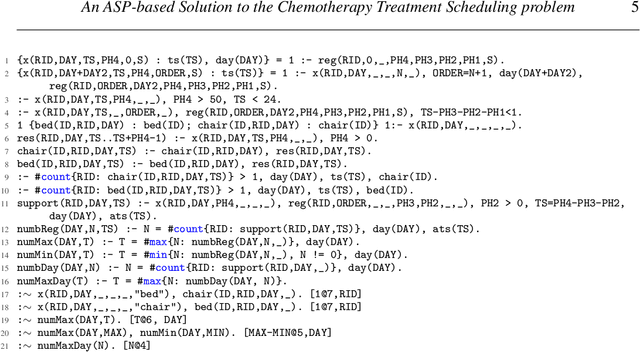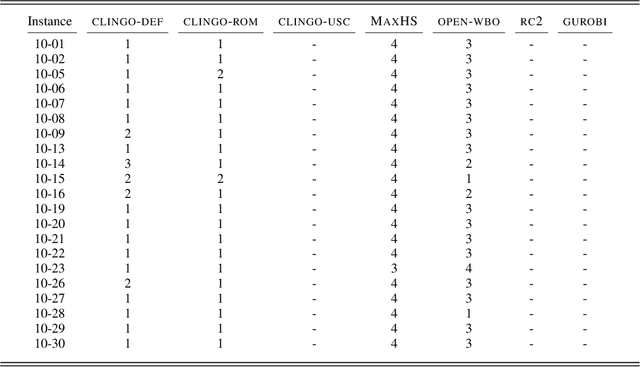Marco Mochi
Improving ASP-based ORS Schedules through Machine Learning Predictions
Jul 22, 2025Abstract:The Operating Room Scheduling (ORS) problem deals with the optimization of daily operating room surgery schedules. It is a challenging problem subject to many constraints, like to determine the starting time of different surgeries and allocating the required resources, including the availability of beds in different department units. Recently, solutions to this problem based on Answer Set Programming (ASP) have been delivered. Such solutions are overall satisfying but, when applied to real data, they can currently only verify whether the encoding aligns with the actual data and, at most, suggest alternative schedules that could have been computed. As a consequence, it is not currently possible to generate provisional schedules. Furthermore, the resulting schedules are not always robust. In this paper, we integrate inductive and deductive techniques for solving these issues. We first employ machine learning algorithms to predict the surgery duration, from historical data, to compute provisional schedules. Then, we consider the confidence of such predictions as an additional input to our problem and update the encoding correspondingly in order to compute more robust schedules. Results on historical data from the ASL1 Liguria in Italy confirm the viability of our integration. Under consideration in Theory and Practice of Logic Programming (TPLP).
CNL2ASP: converting controlled natural language sentences into ASP
Nov 17, 2023



Abstract:Answer Set Programming (ASP) is a popular declarative programming language for solving hard combinatorial problems. Although ASP has gained widespread acceptance in academic and industrial contexts, there are certain user groups who may find it more advantageous to employ a higher-level language that closely resembles natural language when specifying ASP programs. In this paper, we propose a novel tool, called CNL2ASP, for translating English sentences expressed in a controlled natural language (CNL) form into ASP. In particular, we first provide a definition of the type of sentences allowed by our CNL and their translation as ASP rules, and then exemplify the usage of the CNL for the specification of both synthetic and real-world combinatorial problems. Finally, we report the results of an experimental analysis conducted on the real-world problems to compare the performance of automatically generated encodings with the ones written by ASP practitioners, showing that our tool can obtain satisfactory performance on these benchmarks. Under consideration in Theory and Practice of Logic Programming (TPLP).
Planning and Scheduling in Digital Health with Answer Set Programming
Aug 05, 2022
Abstract:In the hospital world there are several complex combinatory problems, and solving these problems is important to increase the degree of patients' satisfaction and the quality of care offered. The problems in the healthcare are complex since to solve them several constraints and different type of resources should be taken into account. Moreover, the solutions must be evaluated in a small amount of time to ensure the usability in real scenarios. We plan to propose solutions to these kind of problems both expanding already tested solutions and by modelling solutions for new problems, taking into account the literature and by using real data when available. Solving these kind of problems is important but, since the European Commission established with the General Data Protection Regulation that each person has the right to ask for explanation of the decision taken by an AI, without developing Explainability methodologies the usage of AI based solvers e.g. those based on Answer Set programming will be limited. Thus, another part of the research will be devoted to study and propose new methodologies for explaining the solutions obtained.
* In Proceedings ICLP 2022, arXiv:2208.02685
An ASP-based Solution to the Chemotherapy Treatment Scheduling problem
Aug 25, 2021



Abstract:The problem of scheduling chemotherapy treatments in oncology clinics is a complex problem, given that the solution has to satisfy (as much as possible) several requirements such as the cyclic nature of chemotherapy treatment plans, maintaining a constant number of patients, and the availability of resources, e.g., treatment time, nurses, and drugs. At the same time, realizing a satisfying schedule is of upmost importance for obtaining the best health outcomes. In this paper we first consider a specific instance of the problem which is employed in the San Martino Hospital in Genova, Italy, and present a solution to the problem based on Answer Set Programming (ASP). Then, we enrich the problem and the related ASP encoding considering further features often employed in other hospitals, desirable also in S. Martino, and/or considered in related papers. Results of an experimental analysis, conducted on the real data provided by the San Martino Hospital, show that ASP is an effective solving methodology also for this important scheduling problem. Under consideration for acceptance in TPLP.
 Add to Chrome
Add to Chrome Add to Firefox
Add to Firefox Add to Edge
Add to Edge